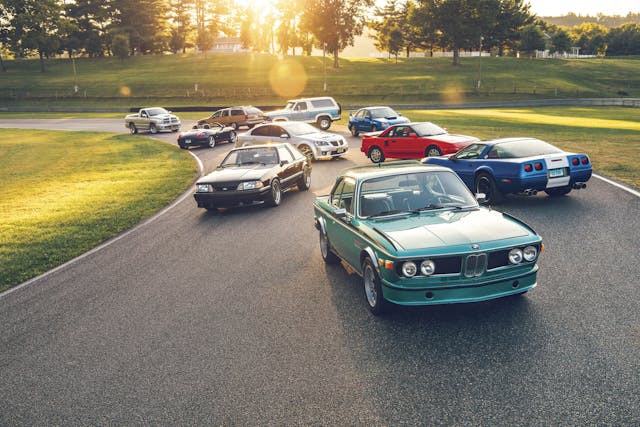Media | Articles
Which Countries Fare Best Among Hagerty’s Bull Market Picks?
Each December, we put together the Hagerty Bull Market List, our annual selection of the collector-car hobby’s movers and shakers. Basically, it’s a group of 10 or so cars (with the occasional truck and motorcycle thrown in) that the data tells us are poised to grow in value over the next 12 months. This isn’t investment advice per se—rather, an opportunity to point out that, with some due diligence and a smidge of luck, you can experience the joys of the collector-car hobby and maybe get your money back or a bit more when it’s time to sell.
The 2025 group we’ll reveal on December 9 will be the eighth list, so we’ve had plenty of time (and opportunity) to assess how our predictions panned out.
Even the most casual gearhead knows that cars, particularly older ones, have a certain national character with some inherent traits. Some automotive stereotypes are unfair (some American cars can turn, some British cars will start every morning, etc.), and some are overly flattering (not all Italian cars are pretty), but “country or origin” is still a useful way of dividing up a large group of cars, be it a private collection or the full pack of cars we’ve picked for our Bull Market list every year since 2018.
We have 72 vehicles from the prior seven lists with at least one year of market returns to evaluate, and they hail from six of the major car-building nations—U.S.A., U.K. Japan, Germany, Italy, and Sweden. Measuring by annualized return of their condition #2 (“excellent”) values, we can see which types of cars soared like we predicted they would, and which ones stumbled. So, when it comes to values, which country has performed best?
Due to demographic shifts and the fact that many of this country’s best-ever cars have been making the transition from used car to classic car in recent years, it’s not too surprising that Japan has the best annualized return of all at 11 percent. Of the 15 Japanese vehicles we’ve picked for Bull Market over the years, the 1993-98 Toyota Supra from the 2018 list and the 2011-12 Lexus LFA from the 2021 list performed the best. The LFA enjoyed a 17 percent annualized return, and while the Supra’s 14 percent is less on an annualized basis, its overall appreciation of 145 percent is one of the highest of any vehicle we’ve ever picked. The only dud out of the Japanese group was the 2003-08 Nissan 350Z, which has been flat since we picked it for he 2023 list.
Marketplace
Buy and sell classics with confidence
Good-old-fashioned American cars have gotten the Bull Market nod more than any other country by far, with 27 vehicles picked overall. Yet they have the lowest average annualized return at 5.2 percent. The 1964-66 Thunderbird, has dropped -2 percent, while the 1981-86 Jeep CJ-8 Scrambler (-14 percent annualized return) and 1997-200 Plymouth/Chrysler Prowler (-10 percent) didn’t do America proud, either. To be fair, all three of those home-grown heroes were on the 2024 list, and this year (particularly the second half) has been a little shaky for collector car values as a whole. Many of our past domestic picks have done better, led by 1984-93 Saleen Mustang and 1991-96 Buick Roadmaster. Both have enjoyed an annualized return of 21 percent, and have more than tripled in value since being on the 2019 Bull Market list.
British cars are typically a sleepier segment of the market when it comes to values, but we’ve still picked five U.K. classics over the years and they’ve enjoyed an average annualized return of 6.5 percent. The 1970-95 Range Rover picked the the 2020 list did best with a 15 percent annualized return. And, despite all the news and controversy about Jaguar lately, the 2000-06 XKR picked for this year’s list has appreciated 11 percent.
The eight Italian cars picked for Bull Market over the years have the highest average price, and their 10.4 percent average annualized return is quite high, too. Leading the way among the Italians is the 1968-76 Ferrari Dino 246, with a 19 percent annualized return since being picked for the 2022 list. Dino values took a step back this year, but this formerly cheap-ish Ferrari is still worth well over half a million dollars in excellent condition. The only Italian that let us down this year’s was the Ferrari FF picked for the 2024 list, and it’s down -1 percent.
Of the 15 German cars we picked over the years, they have had an average annualized return of 8 percent. The big winner representing Deustchland has been the 1990-94 Volkswagen Corrado. Since being picked for the 2020 list, it has enjoyed a 35 percent annualized return, and appreciated 349 percent overall. Looking a little further north, the two Swedish cars we’ve picked for Bull Market are split, with the sinking Saab 900 Turbo down -37 percent since it went on the 2023 list, and the 1981-93 Volvo 240 Wagon notching a massive 36 percent annualized return since going on the 2022 list.
When it comes to the market, which nation’s classics do you think have the brightest future? Tell us in the comments below.






We’ve got a 1990 Mercedes w124 200D with nothing in it but a power passenger side rear view mirror and ABS brakes. Roll up windows, manual transmission, no turbo, no sunroof, no AC, cloth interior, not even airbags. It’s a nearly 20 seconds to 60mph car as well. It’s kind of like a ‘60s vw bug but safer, quieter and super comfy to boot. I’ve been getting up to 42mpg combined. We picked it up barely post pandemic with 115k miles on the clock. It’s driven every day. I’ve been asked many times “how much do you want for it?” It’s not for sale. It’s to enjoy and rely upon!
I’m curious to see the next list but my investment advice is drive what you buy. I want to enjoy the car while in motion.
Where’s France and why Sweden?